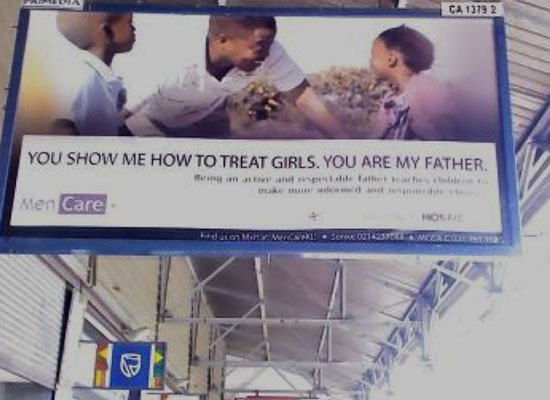 O MenCare+ South Africa, lançado oficialmente em novembro, começou a mostrar resultados concretos entre os sul-africanos. O programa implementou grupos de paternidade, aconselhamento para homens que usaram violência, bem como cursos sexuais sobre saúde reprodutiva para homens e mulheres jovens. O objetivo é ajudar os homens a se tornarem pais mais responsáveis e a quebrar ciclos de violência que podem parecer parte da vida cotidiana.
O MenCare+ South Africa, lançado oficialmente em novembro, começou a mostrar resultados concretos entre os sul-africanos. O programa implementou grupos de paternidade, aconselhamento para homens que usaram violência, bem como cursos sexuais sobre saúde reprodutiva para homens e mulheres jovens. O objetivo é ajudar os homens a se tornarem pais mais responsáveis e a quebrar ciclos de violência que podem parecer parte da vida cotidiana.
A África do Sul é um dos países líderes do mundo quando se trata do número de pais ausentes. Duas em cada três crianças crescem sem o apoio deles. Há muitas razões para isso, como migração laboral e pobreza. Além disso, é um entendimento comum na África do Sul que os homens só devem estar com seus filhos se puderem sustentá-los – caso contrário, eles escolhem estar ausentes.
Segundo um casal que se formou recentemente em um grupo de paternidade, a atividade os ajudou a mudar a dinâmica familiar para melhor: “Começamos a tratar nossos filhos e filhas de forma mais igualitária e renovamos nossa apreciação um pelo outro”.
Outro casal confirmou que o programa está alcançando os sul-africanos: “Nós mudamos de um relacionamento abusivo para um relacionamento livre de violência e onde realmente respeitamos e nos comunicamos um com o outro.”
As iniciativas MenCare+ no país também incluem uma campanha publicitária na Província do Cabo Ocidental que incentiva os homens a se tornarem pais responsáveis. Outdoors foram instalados em estações de trem, rodoviárias e shoppings com a mensagem de que estar com seu filho pode dar à criança e ao pai uma energia gratificante e positiva.
O MenCare+ South Africa foi implementado em parceria com a Sonke Gender Justice Network e a Mosaic e com o apoio da Cidade do Cabo e do Departamento de Saúde. Os serviços policiais da cidade são frequentemente confrontados com violência de gênero e são gratos por iniciativas que ajudam a reduzir o problema. Enquanto isso, o Departamento de Saúde viu como o envolvimento de pais jovens durante a gravidez e o parto contribui para relacionamentos mais fortes e equitativos, bem como uma melhor abordagem para prevenir a transmissão vertical do HIV.